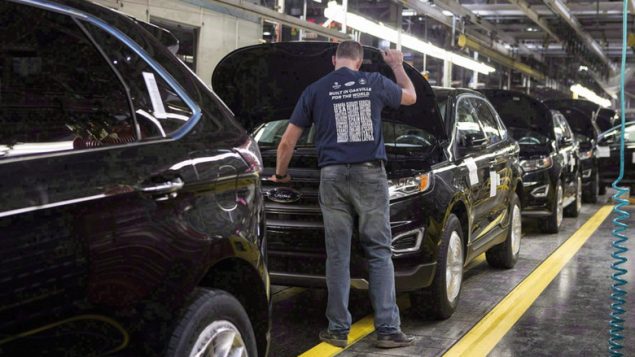NAFTA negotiators are in Montreal this week attempting to further the talks that will lead to a renewed trade agreement between Canada, the United States and Mexico.
Meanwhile, from the World Economic Forum in Davos, Prime Minister Justin Trudeau announced the completion of the Trans Pacific Partnership, a negotiation Canadian passed on last November.
Canadian autoworkers are not happy about the TPP, protesting in Montreal today claiming the partnership will cost 25,000 jobs in Canada.
NAFTA and After
Autoparts are a challenge in the NAFTA talks as well. It’s one of the big five issues in the talks, along with changes to Canada’s dairy industry, a dispute settlement mechanism and a sunset clause.
Ian Lee, is an associate professor at the Sprott School of Business in Ottawa, He says the negotiators are “still far apart on the major issues”.
Listen“It comes down ultimately to the political will of the three parties, of what do they really badly want and what are they more indifferent towards.” he says.

The Ford assembly plant is seen here in Oakville, Ontario. The U.S. wants to hike American and North American content requirements for automobiles as part of the NAFTA talks. (Chris Young/CP)
It’s the Trump presidency that has changed everything.
Lee says the post-war consensus that “liberalised trade was a good thing” is breaking down.
“He (Tump) is of that school, and there are others who agree with him, that trade can be disadvantageous because some countries cheat, is what he argues.”
But Lee does not forecast gloom and doom in the event of a ripped up NAFTA, as he believes Trump ultimately wants a deal, “he just wants a trade deal that is more advantageous to Americans and American workers”, he says.
“They hate NAFTA”
Ian Lee is familiar with the so-called ‘rust belt’ states of Ohio, Indiana, Michigan, and rural, upstate Pennsylvania and New York.
This is unapologetic Trump country, where he says, “they hate NAFTA”.
“Part of me thinks he wants to abrogate the deal, and then I think, because he understands that there’s so many businesses on both sides of the border, and governors, and MP’s and so forth, that support NAFTA, that he would announce a new bilateral trade negotiation with Canada and the United States.”
Lee says in his experience travelling and working in the U.S., there’s a lot of good will toward Canada, but the political theatre of “ripping up the deal” as Trump vowed, would be a win.
“That would allow him to campaign in the off-year elections this fall; 435 Congress men and women up for re-election in the U.S. House, one-third of the senators, all the governors. He would campaign and say, ‘See! I looked after them. I kicked the Mexicans out… and I made Canada come to negotiate a new deal’, and that would resonate.”

Trade tribunals have repeatedly ruled in favour of Canada on softwood lumber, but now the U.S. seems to want to return to a time when it could pick and choose what rulings it would accept. (Christinne Muschi/Reuters)
Lee, who describes himself as “an unalloyed believer in the value of increased, liberalised, trade” says while having no NAFTA would be terrible for Canada, the eventual outcome might be better.
“I am cautiously optimistic that we would negotiate a pretty good deal.” He says a bilateral agreement would have more support and politically, be easier to sell.
“We could come to a new, improved and better NAFTA, if it was abrogated, and then we did a bilateral with the U.S.”
“The Americans right now… are at one of the lowest rates of unemployment in their history”
Lee says however, the NAFTA agreement in effect for the past 23 years, far from “stealing jobs” from the United States, was responsible for the creation of 40 million net new jobs, with the majority of those in the U.S., according to a two year-old study by the statistical organisations of the three countries.
To drive the point home Lee says, “The Americans right now, as we speak, are at one of the lowest rates of unemployment in their history, they’re down to four per cent, which is just unbelievable. That’s considered full employment, where there’s nobody left to employ.”
(With files from CBC, CP, and Reuters)







For reasons beyond our control, and for an undetermined period of time, our comment section is now closed. However, our social networks remain open to your contributions.